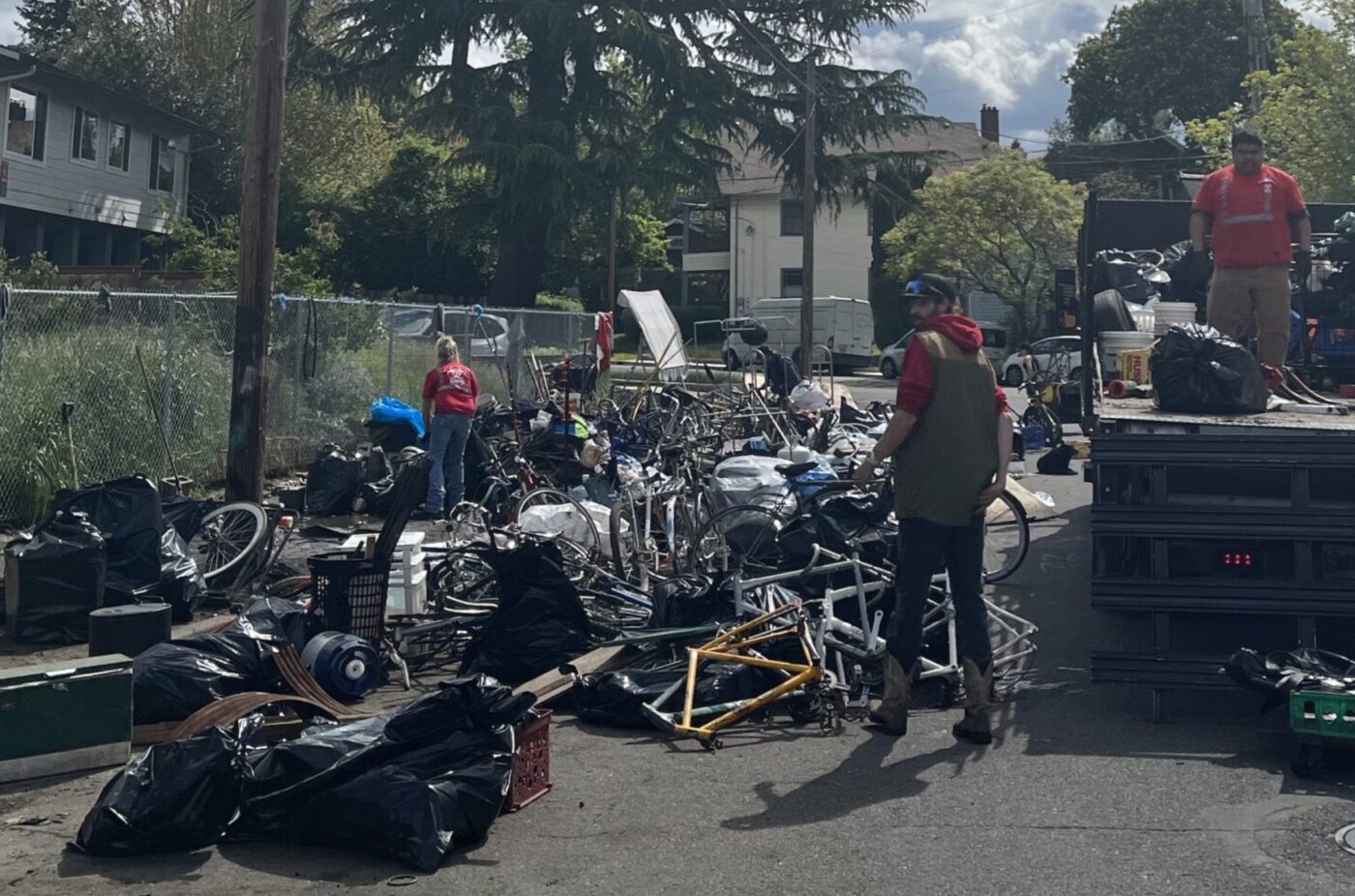 City contracted crews clear out an alleged bicycle chop shop on SE Alder in May 2022. (Photo: Taylor Griggs/BikePortland)
City contracted crews clear out an alleged bicycle chop shop on SE Alder in May 2022. (Photo: Taylor Griggs/BikePortland)
“Everyone is sick of the open-air chop shops that have been allowed to operate around here with impunity.”
At Portland City Council tomorrow (6/7) Mayor Ted Wheeler will call a vote on an ordinance that would ban camping in Portland between 8:00 am and 8:00 pm. It’s part of a major shift on homelessness at City Hall following years of Covid-related restrictions on how the city can address encampments and a political swing among commissioners and the general public that not enough progress has been made to reduce the number of people sleeping outside.
The new camping restrictions are highly controversial, and many people worry that they will unfairly criminalize an already highly vulnerable population of Portlanders. And according to Street Roots, this approach is doomed to fail. Despite this, Wheeler is pushing forward and the conventional wisdom is that he has the votes to pass it.
There are two provisions in the ordinance that relate directly to bicycling. The first is where people will be prohibited from camping. And the second is what they’ll be able to possess while doing so.
If the ban goes through, people will no long be able to camp: overnight on a pedestrian plaza; in the “pedestrian use zone” which is defined by the, “area of the sidewalk corridor on City sidewalks intended for pedestrian travel or access to public transit”; in a park; within 250 feet from a preschool, kindergarten, elementary or secondary school, or a childcare center; within 250 feet from a safe parking site, safe rest village, or sanctioned camping location designated by the Mayor; within 250 feet of lot or parcel containing a construction site; in the public right-of-way along “High Crash Network Streets and Intersections” identified by the Portland Bureau of Transportation; or within 250 feet of an Environmental overlay zone, River Natural overlay zone, River Environmental overlay zone, Pleasant Valley Natural Resource overlay zone, or a special flood hazard area.
These areas include many places where there are bike lanes and bike paths. The ordinance doesn’t include specific language about off-street bicycle paths like the I-205 path or the Springwater Corridor — both of which have become home to hundreds of people in the past several years. However, the environmental overlay zone language is notable because it could mean that the City of Portland will be able to enforce no-camping zones along the Springwater and Eastbank Esplanade paths along the Willamette River, the Columbia Slough path, Marine Drive bike path, and others.
The other part of the ordinance that caught my eye was a specific restriction about the ownership of bicycles. Under the new rules, people who live outside will not be able to,
“Assemble, disassemble, sell, offer to sell, distribute, offer to distribute, or store three or more bicycles or two or more automobiles, a bicycle frame with the gear cables or brake cables cut or an automobile with the battery or one or more tires removed, two or more bicycles or automobiles with missing parts, or five or more bicycle or automobile parts.”
This is an attempt to address “chop shops” where people process many stolen bicycles in order to obscure their identity and prepare them for resale. Chop shops have a long history in Portland. The Police Bureau and city service providers have recovered hundreds (thousands?) of bikes from homeless camps over the years.
In May 2022, neighbors filed multiple complaints about what they believed to be a large chop shop operation on SE Alder near 30th. That encampment — along with dozens of bike frames and parts — was ultimately cleared away.
But determining what is stolen and what is the property of people who live in tents is not easy and Police have had trouble navigating the issue of stolen bikes in homeless camps in the past. In 2013 we reported that despite appearances, the police cannot just assume every bike in a camp is stolen. “The issue is more complicated than you might think,” PPB Sgt. Brian Hughes told BikePortland. “Just because they’re living outside and have a lot of bikes, doesn’t mean they’re bike thieves. They’re entitled to work on a bike just as much as anyone anywhere else.”
Royal Johnson, president of the Timberwolves Cycle Recovery group that helps people get stolen bikes back, told us he’s just happy to see some steps being taken in the direction of more enforcement. “I think that this policy could be beneficial if it actually brings results,” he shared with us in a message last week. “Bike thieves and chops only exist because their is no accountability as long as this stays consistent and there are no loopholes it would be great.”
And Bryan Hance from Bike Index, a site that lists stolen bikes and allows people to register serial numbers, is skeptical the new ordinance will change anything:
“It’s hard to believe there is going to be any actual enforcement. The cynical side of me says this won’t make much of a difference, but at least there’s some sort of acknowledgement of the issue. Everyone is sick of the open-air chop shops that have been allowed to operate around here with impunity.”
According to Wheeler, the ordinance requires written warnings before any penalty is doled out. And people will only receive a citation after two documented warnings. After that, violation of the ordinance could result in criminal penalties and fines.
Read the full ordinance here.

